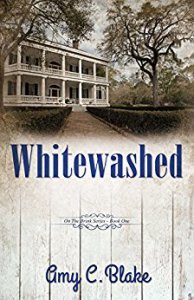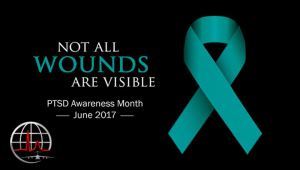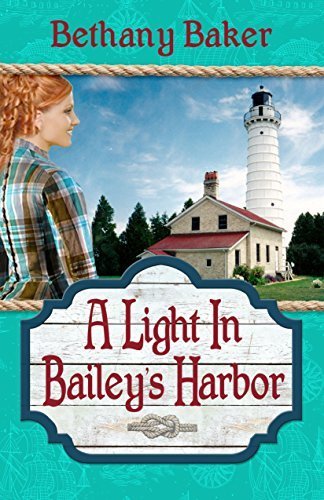#BookReview #Twofer – Amy Blake’s Whitewashed & Colorblind
If there’s an upside to having a sick child and spending an evening on the couch on “trashcan watch”, it’s having a good book (or two) to use as a distraction. I was definitely lucky last night to have recently downloaded author Amy C. Blake’s Whitewashed and Colorblind to my Kindle.
[image error]
When I began reading Whitewashed, I was pleasantly surprised. I don’t know what I expected, but it wasn’t a shift to a narrator that seemed deliciously malicious (and the use of the pronoun “we”–one evil person lurking in the shadows or two?). I positively raced through Whitewashed, several times accidentally turning the pages too fast on my Kindle and having to go back a page or two.
Whitewashed follows Patience (who, unlike her name, is a bit impatient), a nascent college student willing to give up a potential full ride to a prestigious school and instead attend the small institution Verity in her grandparents’ hometown of Hades, where her grandfather was once a professor.
Patience isn’t long at Verity before things start happening, and we realize that there’s something quite sinister lurking just beneath the surface (both literally and figuratively).
There’s an interesting cast of characters, and Blake does a good job weaving her tale. I was equally dismayed and pleased that she’d tricked me when I reached the end; I hadn’t fully guessed the twist as I thought I had.
What’s also pleasant about Whitewashed is that it’s clean fiction; this is a book that you can leave lying about and not feel guilty if your child wanders along behind you and picks up your copy (unlike many other mystery and suspense tales).
I finished Whitewashed around 11:00, and while I had to go on to sleep, I went ahead and downloaded Colorblind to start as soon as I woke up.
I had expected Colorblind to continue Patience’s story, and in a manner of speaking, it did–just not in the way I expected. In the beginning of Whitewashed, Patience mentions her two good friends (and refers to them periodically throughout the novel). Colorblind follows Christy Kane, one of Patience’s best friends.
Colorblind begins with the protagonist being blindsided by news that sends her perfect world crashing down around her ears: therk aher that she loved, trusted, and planned to work alongside has been accused of adultery with another church employee. The media is circling, and Christy barely has time to gather her thoughts before cameras are shoved into her face.
To give Christy a chance to escape from the paparazzi and (hopefully) still complete her summer internship, Christy’s mother negotiates a position at Christy’s Aunt Jo’s music and dance school. There’s just one tiny problem: the school is on the shores of a massive lake, and Christy is beyond terrified of water.
Colorblind is written in a similar fashion to Whitewashed, with the narration shifting between our fair heroine and the person or persons unknown who are intent upon destroying the Pier Ball Room and everyone associated with it.
Both Whitewashed and Colorblind were excellent reads; I look forward to the next novel, telling the third friend’s story.
Have you read a good novel lately? I’d love to hear your recommendations. Connect with me on Twitter (http://www.twitter.com/MickiSClark) or Facebook (http://www.facebook.com/AuthorMickiSC...).
Latest News
 #BookReview #Twofer – Amy Blake’s Whitewashed & ColorblindJanuary 6, 2018Monthly Book Review / WritingIf there’s an upside to having a sick child and spending an evening on the couch on “trashcan watch”, it’s having a good book (or two) to use as a distraction. I was definitely lucky last night to have recently downloaded author Amy C. Blake’s Whitewashed and Colorblind to my Kindle.
#BookReview #Twofer – Amy Blake’s Whitewashed & ColorblindJanuary 6, 2018Monthly Book Review / WritingIf there’s an upside to having a sick child and spending an evening on the couch on “trashcan watch”, it’s having a good book (or two) to use as a distraction. I was definitely lucky last night to have recently downloaded author Amy C. Blake’s Whitewashed and Colorblind to my Kindle.When I began reading Whitewashed, I was pleasantly surprised. I don’t know what I expected, but it wasn’t a shift to a narrator that seemed deliciously malicious (and the use of the pronoun “we”–one evil person lurking in the shadows or two?). I positively raced through Whitewashed, several times accidentally turning the pages too fast on my Kindle and having to go back a page or two.
Whitewashed follows Patience (who, unlike her name, is a bit impatient), a nascent college student willing to give up a potential full ride to a prestigious school and instead attend the small institution Verity in her grandparents’ hometown of Hades, where her grandfather was once a professor.
Patience isn’t long at Verity before things start happening, and we realize that there’s something quite sinister lurking just beneath the surface (both literally and figuratively).
There’s an interesting cast of characters, and Blake does a good job weaving her tale. I was equally dismayed and pleased that she’d tricked me when I reached the end; I hadn’t fully guessed the twist as I thought I had.
What’s also pleasant about Whitewashed is that it’s clean fiction; this is a book that you can leave lying about and not feel guilty if your child wanders along behind you and picks up your copy (unlike many other mystery and suspense tales).
I finished Whitewashed around 11:00, and while I had to go on to sleep, I went ahead and downloaded Colorblind to start as soon as I woke up.
I had expected Colorblind to continue Patience’s story, and in a manner of speaking, it did–just not in the way I expected. In the beginning of Whitewashed, Patience mentions her two good friends (and refers to them periodically throughout the novel). Colorblind follows Christy Kane, one of Patience’s best friends.
Colorblind begins with the protagonist being blindsided by news that sends her perfect world crashing down around her ears: therk aher that she loved, trusted, and planned to work alongside has been accused of adultery with another church employee. The media is circling, and Christy barely has time to gather her thoughts before cameras are shoved into her face.
To give Christy a chance to escape from the paparazzi and (hopefully) still complete her summer internship, Christy’s mother negotiates a position at Christy’s Aunt Jo’s music and dance school. There’s just one tiny problem: the school is on the shores of a massive lake, and Christy is beyond terrified of water.
Colorblind is written in a similar fashion to Whitewashed, with the narration shifting between our fair heroine and the person or persons unknown who are intent upon destroying the Pier Ball Room and everyone associated with it.
Both Whitewashed and Colorblind were excellent reads; I look forward to the next novel, telling the third friend’s story.
Have you read a good novel lately? I’d love to hear your recommendations. Connect with me on Twitter (http://www.twitter.com/MickiSClark) or Facebook (http://www.facebook.com/AuthorMickiSClark)....
 Why I #AmWriting About PTSDJanuary 3, 2018The Soldier's Wife / WritingI was recently chatting online with some people about my work in progress, The Soldier’s Wife. I was telling them about my plans for the characters, and we started talking about my plans for Uriah. In the Bible, Uriah is a soldier. In my novel, he becomes Ryan, a special forces member who has come back from a recent deployment not quite himself. He’s struggling with PTSD, which is one of the contributing factors to the breakdown of his marriage to Barbara (Bathsheba).
Why I #AmWriting About PTSDJanuary 3, 2018The Soldier's Wife / WritingI was recently chatting online with some people about my work in progress, The Soldier’s Wife. I was telling them about my plans for the characters, and we started talking about my plans for Uriah. In the Bible, Uriah is a soldier. In my novel, he becomes Ryan, a special forces member who has come back from a recent deployment not quite himself. He’s struggling with PTSD, which is one of the contributing factors to the breakdown of his marriage to Barbara (Bathsheba).One of the people raised this question: why give Ryan PTSD? It’s a good question. Here’s why.
PTSD, or Post-Traumatic Stress Disorder, is becoming very prevalent in our society. Here are some statistics, courtesy PTSD United:
8% of Americans have PTSD at any given time. That’s over 24 million people.
The Veterans’ Administration (VA) estimates that up to 20% of Operation Enduring Freedom veterans suffer from PTSD. That’s 400,000 soldiers.
In the past year, the number of diagnosed cases in the military jumped fifty percent–and that’s just the diagnosed cases.
If those statistics aren’t sobering enough, here are a few others from the VA:
In 2014, 18% of all adult suicides in the United States were military veterans.
That is an increase of 32% since 2001.
The increase of female veteran suicide rates is an even more alarming 85.2%.
Unfortunately, our society doesn’t like to talk about the “ugly” side of war. It’s only been in the recent past that we have begun to truly discuss and learn about the atrocities of the Vietnam War (and if you don’t know much about the war, I highly recommend Ken Burns’ documentary).
It’s not a disservice to Uriah to give his modern counterpart PTSD. PTSD is a very real struggle that many of our military (and, let’s face it, non-military) families face every day. Simply “not talking about it” won’t make it go away.
Aside from calling attention to the issue, I think including it also gives more potential depth to the characters. We really must think about the motives that everyone has for their behavior (from David to Uriah to Bathsheba), and how each bear their own responsibility for everything that is to come.
There’s no doubt Uriah was a good soldier. He wanted to stay with his men. But what kind of husband does that make him? Well, that’s one of the things that I explore in The Soldier’s Wife.
What are your thoughts? I’d love to hear them!...
 I am (Not) ResolvedJanuary 1, 2018WritingCall me a rebel, but I don’t do resolutions. I know today’s The Day, and everyone’s been happily posting theirs online all morning, but I just can’t.
I am (Not) ResolvedJanuary 1, 2018WritingCall me a rebel, but I don’t do resolutions. I know today’s The Day, and everyone’s been happily posting theirs online all morning, but I just can’t.For me, it never made sense to wait until a certain day to start something. Going to start a diet? Start it. Don’t cheat for two weeks and wait to start on the first Monday of a new month.
So, here are the things I am (not) resolved to do this year (because I already started them):
Exercise more – About a month ago, I started a new fitness program someone recommended to me. I have had five abdominal surgeries, and my stomach’s a wreck. This program is meant for postnatal moms, and while it’s been a year or eight since I last gave birth, I thought it would be perfect for me in my post-c-section-post-appendectomy-post-gallbladder state. I really enjoy it, and so far I have been working out four times a week with this program.
Eat right – last year, I started the Trim Healthy Mama plan (any other THMs in the house)? Anyway, we’ve been eating this way for months now, and while I don’t plan on doing much differently, I am continually growing in my understanding of the concepts and branching out to try new recipes and ingredients. Newsflash: there are zucchini in my fridge that I bought because I like them. I’m not sure what to do with that.
Write more – I am so bad about putting everybody else first. I’ve wiped a lot of things off my plate, so I won’t feel as guilty about spending more time at the computer. I’m finished with National Board Certification (woo hoo!), and I recently sent in my application to be a Google Trainer after finishing my Level 2 certification. There’s not really much standing in my way except, you know, me. So there’s that.
Participate more in the writing community – Ya’ll, I’m bad about reviewing other people’s novels. Which is terrible, since I wish more people would review mine, but that’s neither here nor there. Last month, I’ve started writing a review every time I finish a book unless the author is long since deceased (and considering that I teach literature, that’s a fair concession, I think. Otherwise Shakespeare would be getting all sorts of favorable reviews from some chick in Kentucky).
So what about you? Do you “do” resolutions? If so, what are they?...
 #BookReview: A Light in Bailey’s HarborJanuary 1, 2018Monthly Book Review / WritingRecently, I had the pleasure to spend an afternoon reading A Light in Bailey’s Harbor, by Bethany Baker (Follow her on Facebook here).
#BookReview: A Light in Bailey’s HarborJanuary 1, 2018Monthly Book Review / WritingRecently, I had the pleasure to spend an afternoon reading A Light in Bailey’s Harbor, by Bethany Baker (Follow her on Facebook here).As the listing on Amazon reads, “Katy Kippling has an abundance of personality, or so she was told by a recent male acquaintance. Trying to conform to the etiquette of an 1880’s lady is difficult enough, without adding the challenges of having an abundance of personality.
Katy loves the Cana Island Lighthouse, serving her small lakeside town in Bailey’s Harbor, Wisconsin. In the summer of 1880, the new lighthouse keeper arrives. While Katy imagines his stately captain’s beard and noble brow, Blake Strawberry, the new keeper, is quite the opposite.
Blake is a young man searching for something to heal the pain and heartaches of his past. By moving west and accepting this new position, he plans to forget all of his painful memories and disappointments. What he hasn’t counted on is that the Lord’s voice can be heard just as clearly in Wisconsin as in Massachusetts.”
A Light in Bailey’s Harbor was a pleasant afternoon read. I enjoyed the very interesting potential origin story of the hymn “It Is Well With My Soul”. While Katy Kippling is the main character, my personal favorite was her friend, a non-native English speaker who frequently spouted malapropisms in her endearing accent.
I wasn’t ready for A Light in Bailey’s Harbor to end; in fact, I double-checked my Kindle to be sure I hadn’t accidentally skipped more chapters. Alas, it was over, and so was my stay at the Wisconsin lighthouse. Why don’t you pick up a copy of the novel and go for a visit yourself?...
 Five Things I Learned About Being A “Real” AuthorDecember 31, 2017WritingWe’re wrapping up 2017. It’s been a big year for me, personally and professionally. Publishing my first novel has taught me a lot that I never knew about literature–and that’s saying something, considering that I am a teacher of literature! Here are five things that I learned this year:
Five Things I Learned About Being A “Real” AuthorDecember 31, 2017WritingWe’re wrapping up 2017. It’s been a big year for me, personally and professionally. Publishing my first novel has taught me a lot that I never knew about literature–and that’s saying something, considering that I am a teacher of literature! Here are five things that I learned this year:Reviews Are Important – I never really thought about reviewing novels before. I honestly never gave it a second thought; especially the novels by best-selling authors. But once I became an author, I realized how important reviews are. Aside from the fact that reviews help put your novel out there for other people, reviews teach you important things about your own writing. A lot of my friends have read my book, but I don’t know anything about what they thought. I don’t know which characters they loved or hated, which parts they wished had been longer, and which jokes they thought were annoying. A good, honest review is very valuable to an author and really helps them hone their craft.
2. Writing is a LOT of work – Boy, is it a lot of work. It takes hours to write a draft of a chapter. Then it takes more hours to revise that chapter. Your average novel is 25 – 30 chapters long. That can be 180 hours just to write your first draft. If you were working a regular 40-hour workweek, that’s almost a month. And that’s just the first draft. That doesn’t count your own revisions before you send it off to an acquisitions editor, who may or may not request additional revisions before offering a contract. Then, there are additional revisions to be made. When you and your publisher finally agree on all the revisions, then there’s another final proofreading read-through. It takes forever. I signed my contract for Don’t Ask Me to Leave in July. It wasn’t published until March of the following year, and somebody was working on something pretty much up until that date.
3. You Can’t Do It Alone – It’s funny. Writing is one of the most social anti-social professions I’ve ever seen. You have to write the manuscript yourself, sure. But from there, you can’t do it alone. You rely on so many others along the way. You rely on the help of your editor, your publisher, your cover art designer, and countless other people to get the book on the shelves (or to digital readers), but it doesn’t stop there. Once the book is published, you need the help of others to help get the word out about your book. Again, I feel guilty about this one. I so rarely shared good books I read with other people (and in a way, it’s kind of my job). In 2018, I’m making a much bigger effort to share with others.
4. Where You Sell Matters – Again, I hadn’t really thought about this one. I figured it all worked pretty much the same way. I also didn’t think much about print versus eBooks. A book was a book, or so I thought. But as it turns out, some companies are a lot more friendly to authors (like Amazon). And it also matters how you sell. For example, if someone gets the book on Kindle and only reads 1/3 of it, you don’t make as much money than if they read the whole book (which means it’s definitely worth your while to work hard on making the book engaging!)
5. You Have To Keep an Open Mind – If you had told me three years ago that I would write and publish a contemporary romance novel, I’d have laughed in your face. I don’t read romance novels, as a rule. I don’t even watch “chick flick” movies. I always figured I’d write YA fantasy . . . but here I am. I’ve learned that you have to keep an open mind, no matter what. For example, I see my character one way, but an editor might not. If I’m open to suggestions, we might both be able to come to a much more beneficial interpretation.
What about you? What do you wonder about the publishing world?...



